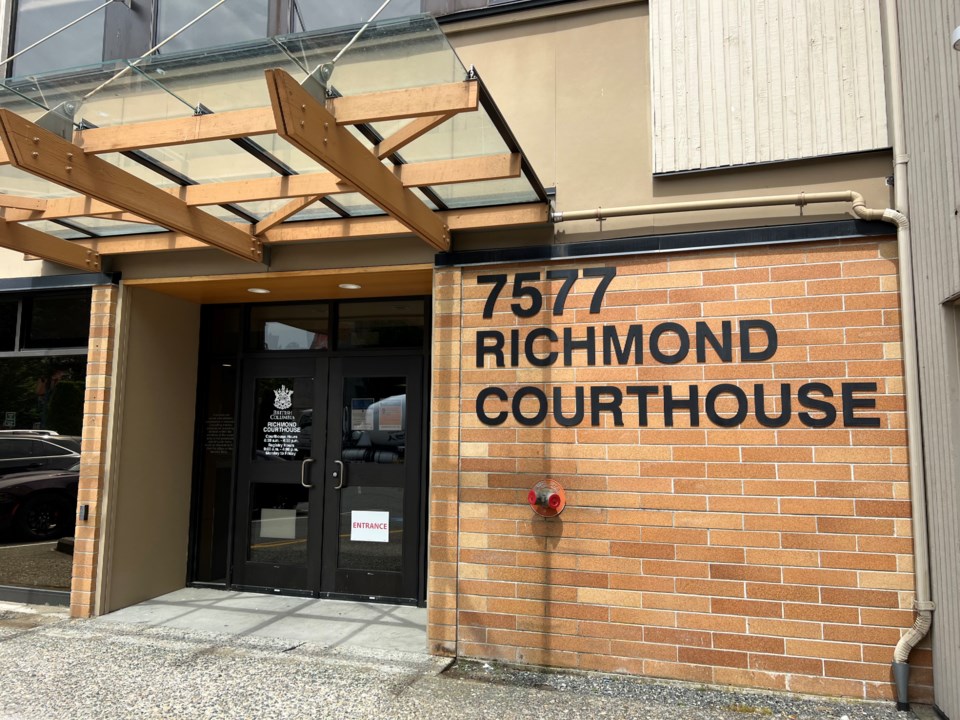A Richmond woman has been found guilty of immigration fraud for her "multifaceted deception scheme" involving false immigration documents in the Yukon.
Tzu Chun Joyce Chang appeared in person in Richmond Provincial Court on Wednesday afternoon to hear her fate.
Chang was one of four Richmond residents charged in December 2020 for immigration fraud after a five-year investigation called Project Husky, which also included Qiong Joan Gu, her daughter Aillison Shaunt Liu (also known as Allison Shaunt Liu) and UCII employee Shouzhi Stanley Guo.
A Yukon government official, Ian David Young, was originally charged in the case but later died, said Richmond Provincial Court Judge Bonnie Craig in her decision.
The individuals were found to be involved in an immigration scheme where Chang's company, USA-Canada International Investment Inc. (UCII), submitted forged nomination certificates in support of 70 applicants who did not qualify for the Yukon Business Nominee Program (YBNP).
Chang was accused of telling victims, directly and indirectly, of a fictitious new YBNP with less stringent requirements.
The trial experienced delays after it began in 2022, partly due to Chang's issues with finding a lawyer. By the time of closing submissions, Chang was self-represented.
A stay of proceedings was ordered for Gu and Liu in January and Guo was found not guilty in June, leaving Chang to be the only remaining accused.
Chang faced 11 charges for knowingly misrepresenting facts that could induce an error in the administration of the Immigration and Refugee Protection Act (IRPA), communicating false information with the intent to induce immigration to Canada and causing people to use a forged document.
Funds redirected from clients to personal businesses
In her decision, Craig found Chang guilty of all 11 charges.
She found Chang was neither credible nor reliable as her evidence was inconsistent, at times with her own evidence, at times with the prosecution's main witnesses and at times inconsistent with documentary evidence.
Chang was "evasive" when giving direct evidence and "evasive and argumentative" when she was cross-examined by the prosecution.
"She had to be told by the court repeatedly to answer the questions. She often tried to distance herself from discriminatory evidence and documentation by giving improbable explanations and blaming others," said Craig.
Some of Chang's attempts included her claim that a lawyer and an immigration consultant were in control of the application process, as well as her submission that she hired someone in China, and later UBC graduates, to write up business plans for the applications.
The lawyer and the consultant were hired to look at the applications with forged certificates after they were completed, and emails from Chang showed her giving instructions on preparing the business plans.
She added Chang's evidence did not raise any reasonable doubt she committed the offences.
Craig found "a wealth of evidence" to show Chang's involvement in the application process and rejected Chang's attempts to minimize her role as emails and witness evidence showed Chang was in control of the operation.
She determined Chang had paid Gu at least $230,000 for nomination certificates that she knew were not real, and Chang had diverted almost $3 million out of the $7.8 million sent to UCII by applicants to companies unrelated to the Yukon, some of which were controlled by her.
Chang had attempted to conceal the purpose of the payments to Gu, said Craig, as banking records showed the $230,000 was paid by three bank drafts and 10 cheques from UCII to another person. The cheques were ultimately deposited into a bank account belonging to Gu's daughter, Aillison Liu, and Chang admitted during the trial the payments were "really meant for Ms. Gu."
Although Chang claimed the payment was for the $100,000 she owed to Gu for an alleged sale of the mine, she did not explain why she ended up paying more than double the amount. Most of the cheques also had the names of the permanent residency applicants written in the memo section, and Craig found Chang's suggestion that these were a "random mistake" to be "an entirely unbelievable explanation."
Craig decided there was no other reasonable conclusion other than Chang knew the certificates were false and the 70 applications were invalid for reasons including the failure to fulfil the English language requirement.
False nomination certificates part of 'multifaceted deception scheme'
She did not believe Chang was "duped" into believing there was a new YBNP program and noted Chang came across as an "intelligent and savvy businesswoman" with years of experience working with clients in this area.
Craig also found Chang knew she was not licensed to represent the applicants and made efforts to conceal her involvement in the application process.
"She was precisely the type of ghost consultants that the 2011 amendment (to IRPA) aimed to capture," she said.
In her decision, Craig determined Chang had directed a "multifaceted deception scheme" in which the use of false nomination certificates was one of the facets.
The scheme started with Chang asking applicants to apply for a fake scheme, said Craig, which continued through the transfer of investment funds from clients and payment for fake nomination certificates and ended with the submission of the applications to be treated as genuine by Immigration, Refugees and Citizenship Canada.
In addition to the criminal lawsuit, UCII and Chang are currently facing a civil lawsuit filed by a Chinese immigration company and more than 50 alleged victims of the Yukon immigration scheme.
The parties are scheduled to meet on Jan. 2 to set a day to appear before Craig to discuss the next steps so Chang has the opportunity to seek legal advice if she wishes to do so.
Got an opinion on this story or any others in Richmond? Send us a letter or email your thoughts or story tips to [email protected].



